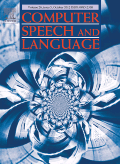
COMPUTER SPEECH AND LANGUAGE
Scope & Guideline
Exploring Innovations in Speech and Language Technologies
Introduction
Aims and Scopes
- Speech Enhancement and Recognition:
The journal emphasizes research on improving speech recognition systems and enhancement techniques, particularly in challenging acoustic environments. This includes the development of algorithms for noise reduction and clarity in speech signals. - Natural Language Processing (NLP) and Understanding:
It covers the methodologies for processing and understanding human language, including sentiment analysis, dialogue systems, and text generation, focusing on how machines can effectively interpret and generate human language. - Multimodal Interaction and Human-Computer Interaction:
Research on integrating speech with other modalities (e.g., visual, tactile) to enhance human-computer interactions is a significant focus, exploring how users interact with technology through speech. - Machine Learning and Deep Learning Applications:
The journal extensively covers the application of machine learning and deep learning techniques to various speech and language tasks, including speech synthesis, emotion recognition, and cross-lingual processing. - Cognitive and Clinical Applications:
Research addressing cognitive aspects of speech processing and its clinical applications, such as detecting and analyzing speech patterns in conditions like dementia or Parkinson’s disease, showcasing the journal's commitment to real-world impact.
Trending and Emerging
- Deep Learning Innovations:
There is a growing trend in the application of deep learning methodologies, particularly in areas like speech enhancement, recognition, and synthesis, reflecting the rapid advancements in neural network architectures. - Emotion Recognition and Affective Computing:
Research focusing on detecting emotions through speech is on the rise, emphasizing the importance of understanding human emotions in interactions with AI systems and enhancing user experience. - Conversational AI and Dialogue Systems:
Papers exploring advancements in conversational agents and dialogue systems are increasingly prevalent, driven by the demand for more natural and context-aware interactions. - Multimodal Learning and Integration:
A trend towards integrating multiple modalities (e.g., audio-visual data) in speech processing research is emerging, indicating a shift towards more holistic approaches in understanding human communication. - Ethics and Privacy in Speech Technology:
Emerging concerns regarding ethics and privacy in speech technology applications are becoming crucial, with research focusing on secure and responsible AI implementations gaining importance.
Declining or Waning
- Rule-Based Approaches in Speech Processing:
There is a noticeable decrease in the publication of studies focused on traditional rule-based methods for speech processing, as the field increasingly favors data-driven and machine learning approaches. - Low-Resource Language Processing:
Although still relevant, the frequency of papers specifically dedicated to low-resource languages has diminished, possibly due to a shift towards more universally applicable models and languages with greater resources. - Traditional Acoustic Modeling:
Research centered around conventional acoustic modeling techniques is less prevalent, as newer methods leveraging deep learning and neural networks gain traction. - Basic Speech Signal Analysis:
Basic research focused on foundational speech signal analysis techniques appears to be waning, as the field progresses towards more complex and integrated approaches involving multimodal data.
Similar Journals
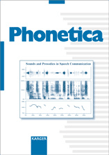
PHONETICA
Pioneering Research at the Intersection of Sound and LanguagePHONETICA, published by De Gruyter Mouton, is a premier journal specializing in the interdisciplinary study of phonetics, phonology, and their applications in linguistics and acoustic sciences. With an impressive scope covering critical aspects of acoustics and language, PHONETICA has established itself as a leading platform for innovative research since its inception in 1957, continuing through to 2024. The journal boasts a significant impact, reflected in its esteemed Q1 ranking in both Acoustics and Ultrasonics and Linguistics and Language categories as of 2023, positioning it in the top quartile of scholarly journals in its field. PHONETICA's rigorous publication standards attract a diverse array of researchers and professionals, eager to disseminate their findings in an engaging and scholarly environment. Although not open access, the journal remains a vital resource for those seeking to deepen their understanding and contribute to the evolving dialogue in phonetic research.
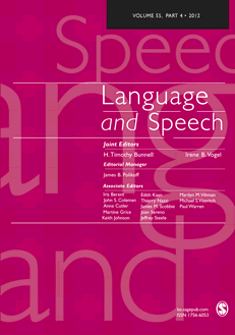
LANGUAGE AND SPEECH
Advancing the Frontiers of Communication ScienceLANGUAGE AND SPEECH, published by SAGE PUBLICATIONS LTD, is a premier journal that serves the multifaceted realms of linguistics, speech science, and sociology. With a robust history of scholarly contribution since 1958 and an anticipated continuation through to 2024, the journal is recognized for its high-impact research, boasting a commendable impact factor and achieving Q1 ranking in both Linguistics and Sociology as well as Q2 in Medicine and Speech and Hearing categories as of 2023. The journal, available in both print and online formats with ISSN 0023-8309 and E-ISSN 1756-6053, provides a vital platform for interdisciplinary discourse among researchers, professionals, and students alike. Its rigorous review process and quality publications place it at the forefront of academic inquiry, offering critical insights that advance the understanding of language and its implications in various contexts. As a key resource in the field, LANGUAGE AND SPEECH continues to foster innovation and knowledge dissemination, making it an essential addition to the libraries of those committed to exploring the depths of communication sciences.

EURASIP Journal on Audio Speech and Music Processing
Innovating the future of speech and music technologies.EURASIP Journal on Audio Speech and Music Processing is a distinguished open-access journal published by Springer, focusing on the rapidly evolving fields of audio, speech, and music processing. Established in 2006, this journal has become a pivotal platform for researchers, professionals, and students interested in advancing the state-of-the-art technologies and methodologies in acoustics and electronic engineering. With an impressive impact factor and ranking—Q2 in both Acoustics and Ultrasonics and Electrical and Electronic Engineering—this journal serves as a vital resource, disseminating innovative research findings that contribute to the academic and practical realms of audio processing. The rigorous peer-review process ensures that only high-quality manuscripts are published, reinforcing the journal's credibility and importance in the field. The journal is indexed in prominent databases, making it accessible to a global audience keen on exploring the latest developments from 2007 to 2024 and beyond. For researchers looking to share their work or stay abreast of the latest advancements, EURASIP Journal on Audio Speech and Music Processing is an essential resource that champions the interplay of science and technology in audio processing.
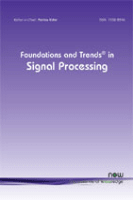
Foundations and Trends in Signal Processing
Connecting scholars with groundbreaking Signal Processing discoveries.Foundations and Trends in Signal Processing is a premier academic journal published by NOW PUBLISHERS INC, specializing in the dynamic field of Signal Processing. With an impressive 2023 Q1 rank in its category and a notable position of 3rd out of 131 in the Scopus rankings for Computer Science and Signal Processing, this journal stands at the forefront of research dissemination in its domain. Established in 2007, it has provided a platform for high-quality research articles that cover cutting-edge topics and emerging trends in Signal Processing, which is critical for advancements in areas such as communications, image processing, and machine learning. Although the journal operates under a subscription model, it offers a wealth of vital information aimed at researchers, professionals, and students alike, fostering a robust academic dialogue and enhancing the knowledge base within this important field.

CAAI Transactions on Intelligence Technology
Catalyzing Collaboration in Intelligent Technology ResearchCAAI Transactions on Intelligence Technology is a premier peer-reviewed journal published by WILEY, dedicated to advancing the fields of Artificial Intelligence, Computer Networks and Communications, Computer Vision and Pattern Recognition, Human-Computer Interaction, and Information Systems. Since its inception in 2017, this Open Access journal has rapidly ascended the ranks, achieving Q1 quartile status across multiple categories as of 2023, and is recognized for its rigorous standards and innovative research dissemination, evidenced by impressive Scopus rankings, including Rank #12 in Computer Vision and Pattern Recognition. Through its commitment to providing a platform for high-quality research, the journal invites contributions from scholars globally, fostering a collaborative environment that stimulates intellectual exchange and encourages advancements in intelligent technology. Addressed to researchers, professionals, and students alike, CAAI Transactions on Intelligence Technology serves as a vital resource for those aiming to stay at the forefront of technological innovation.
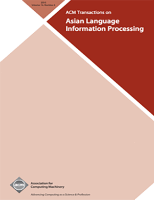
ACM Transactions on Asian and Low-Resource Language Information Processing
Exploring the frontiers of low-resource language processing.ACM Transactions on Asian and Low-Resource Language Information Processing is a distinguished scholarly journal published by the Association for Computing Machinery (ACM), focusing on the processing of Asian and low-resource languages in the field of computer science. With an ISSN of 2375-4699 and an E-ISSN of 2375-4702, this journal serves as a vital platform for researchers and professionals dedicated to advancing language technology and natural language processing in underrepresented linguistic contexts. It has achieved a notable position in the academic community, ranking #94 out of 232 in the broader category of Computer Science with a 59th percentile ranking according to Scopus. As the journal converges on its comprehensive goals from 2015 to 2024, it emphasizes open debates and innovative methodologies to tackle challenges relevant to low-resource language processing. This commitment to publishing high-quality research, though it does not currently offer open access, ensures that the journal remains an essential resource for researchers, educators, and students striving to contribute to this dynamic field.

PROCESAMIENTO DEL LENGUAJE NATURAL
Connecting Scholars in Computer Science and LinguisticsPROCESAMIENTO DEL LENGUAJE NATURAL, published by the SOCIEDAD ESPAÑOLA DE PROCESAMIENTO DEL LENGUAJE NATURAL (SEPLN), is a premier journal that serves as a vital resource in the interdisciplinary fields of Computer Science and Linguistics. With an impressive 2023 impact factor ranking it as Q2 in Computer Science Applications and Q1 in Linguistics and Language, this journal offers valuable insights into the latest advancements and research trends. Based in Spain, and associated with the University of Alicante, the journal provides a platform for the dissemination of high-quality research, contributing significantly to the understanding of natural language processing and its applications. Although it operates under a traditional subscription model, the accessibility and relevance of its content make it an essential read for researchers, professionals, and students keen on exploring the intersection of language and technology. The journal’s performance, reflected in its Scopus ranks that place it in the top percentiles across various categories, reaffirms its importance in academia and its commitment to fostering innovation and knowledge in the field.

CoDAS
Innovating understanding in linguistics and auditory science.CoDAS, an esteemed academic journal published by the SOC BRASILEIRA FONOAUDIOLOGIA, serves as a leading platform for interdisciplinary research within the realms of linguistics, speech, and hearing sciences. Established as an Open Access journal in 2013, it ensures broad dissemination and accessibility of scholarly work, significantly benefitting researchers, clinicians, and students alike. Based in Brazil, CoDAS has garnered credibility with its impressive Q2 ranking in Linguistics and Language, as well as its rankings in Otorhinolaryngology and Speech and Hearing categories, reflecting its substantial contribution to these fields. The journal's impact is underscored by its robust Scopus rankings, including the 67th percentile in Language and Linguistics. With a commitment to fostering innovative research and bridging gaps between theory and practice, CoDAS continues to play a vital role in advancing knowledge and clinical practices in communication disorders and auditory sciences.
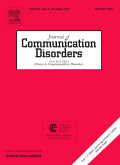
JOURNAL OF COMMUNICATION DISORDERS
Pioneering Insights into Communication Challenges.Journal of Communication Disorders (ISSN: 0021-9924; E-ISSN: 1873-7994) is a leading publication in the field of communication disorders, published by Elsevier Science Inc. With a converged publishing timeline from 1967 to 2024, this journal has established itself as a vital resource for researchers, clinicians, and educators dedicated to advancing knowledge in areas such as linguistics, language processing, speech, and hearing. It boasts an impressive reputation, ranking in the Q1 category for Linguistics and Language, and Q1 in LPN and LVN as well as Q2 in Speech and Hearing for 2023, highlighting its influence and scholarly impact within these domains. The journal is recognized for its rigorous peer-reviewed articles and its contributions to our understanding of cognitive neuroscience, experimental psychology, and communication disorders—further evidenced by its ranking in the top percentiles in various fields. Although it does not currently offer Open Access options, readers and contributors alike will appreciate the depth and breadth of research published within its pages. This journal serves an essential role in bridging the gap between research and practical application, making it a must-read for anyone involved in the study or treatment of communication disorders.
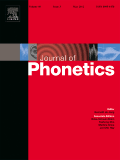
JOURNAL OF PHONETICS
Transforming Understanding of Spoken LanguageThe Journal of Phonetics, published by Academic Press Ltd - Elsevier Science Ltd, stands as a premier resource in the field of phonetics, linguistics, and speech science. With an impressive impact factor and recognition as a Q1 journal in both Linguistics and Language and Speech and Hearing categories, it consistently presents cutting-edge research findings that shape the understanding and methodologies in these domains. The journal provides a platform for researchers and practitioners to disseminate significant developments from 1995 through to 2024, ensuring a rich repository of knowledge for any scholar's reference. Despite not offering open access, it boasts an esteemed reputation, with Scopus rankings placing it within the top echelons of its categories—solidifying its status as an essential reading for those dedicated to advancing their expertise in the study of spoken language. Located in the heart of London, the journal catalyzes discourse amongst linguists, speech therapists, and students alike, fostering a deeper comprehension of phonetic phenomena.